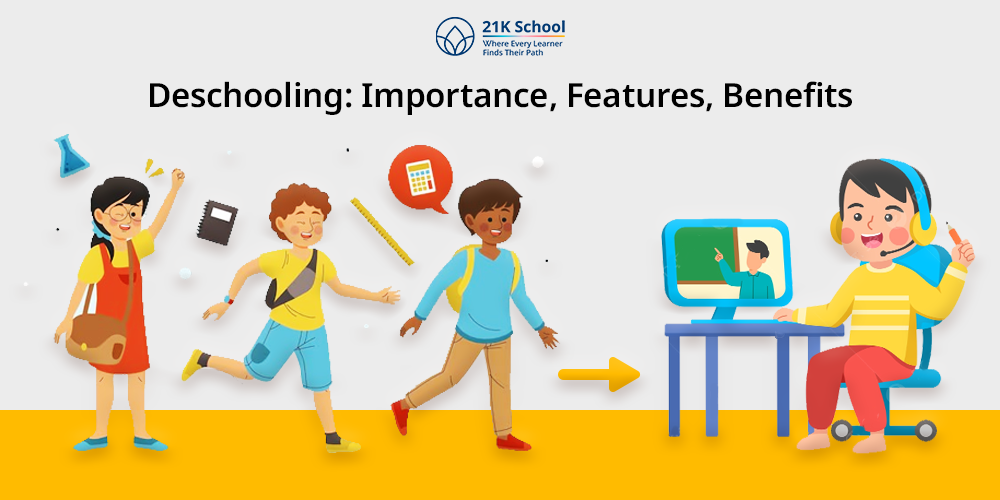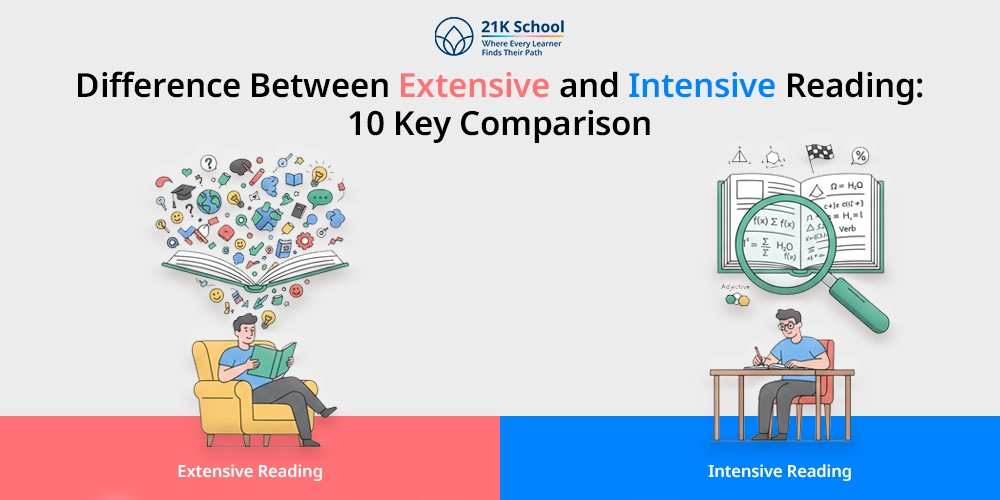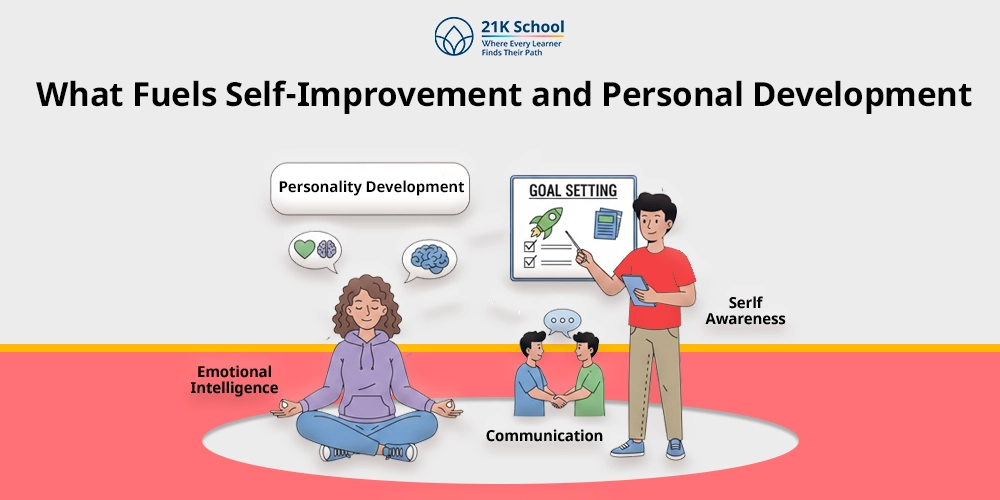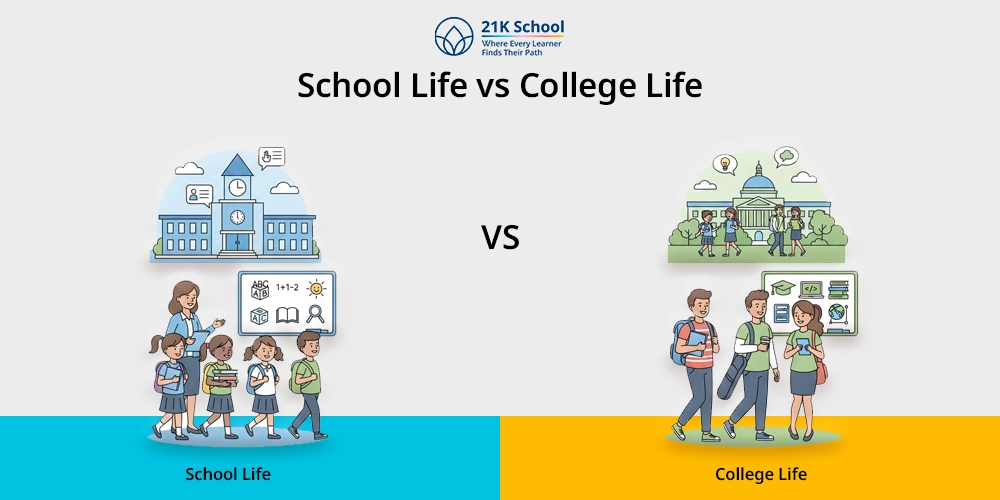
Have you ever thought of transitioning between traditional schooling and homeschooling?
The term de-schooling has gained popularity in recent years. Students transition from traditional schools to homeschooling during a time known as de-schooling.
In general the term de-schooling, which is primarily used by homeschoolers and educators, refers to the process by which students stop attending school and begin studying at home.
Children take a vacation from their regular study schedule and regimented classroom setting when they deschool. Through deschooling, students can discover their own learning styles and cognitive capacities.
De-schooling times vary from student to student, though as some kids take longer breaks while others take shorter ones. Students can freely explore their learning style and abilities thanks to de-schooling.
During this phase, which is also referred to as the recreation stage, students take a vacation from the classroom. In India, there are several options for homeschooling, including Dreams Time Learning Schools, K8 schools, 21K School and others. The term de-schooling is associated with homeschooling.
Table of Contents
What is Deschooling in Education?

The period of time between traditional schooling and homeschooling is referred to as de-schooling.
Ivan Illich originally used the term de-schooling in 1971 emphasising the concept of substituting a more flexible and accessible educational system for the formal education approach.
De-schooling is the process of temporarily moving from traditional classrooms to online ones. The phrase de-schooling refers to a time when students take a break from their structured educational system it has nothing to do with homeschooling or online learning.
Children can develop their interests and learning skills through deschooling. Many students seek to restore their school environment and discover flexible study methods through deschooling.
De-schooling enhances students mental health as they get rest from the formal education system and allows them to study as per their convenience and flexibility.
Deschooling Society

An Austrian philosopher and theologian who, in 1971, questioned the function and practices of education in the modern world. Formal education only limits students’ ability to think and be creative, according to the deschooling society.
Education can be obtained in any way and at any time; it is not restricted to a single space. In a deschooling society, education can be obtained in alternative ways and through unstructured self-directed learning without the need for formal instruction.
Ivan Illich emphasizes education and schools in his book Deschooling Society, which offers theoretical and antiquated information. Although Deschooling Society was published in 1971, it still has relevance to the state of education today.
Rather than emphasizing active learning Illich’s book focuses on the concept of open and distance learning initiatives. According to Ivan’s books, schools are the main means of disseminating knowledge, education is like a domino effect which can take place in a relatively fixed learning environment.
Illich believes that education should be accessible, practical and open to everyone and that it should be possible to obtain it anywhere.
The implementation of interdisciplinary programs like competency-based education, Massive Open Online Courses (MOOCs) distance education, homeschooling etc. is how Illich’s concept relates to modern education.
Importance of De-schooling

Students curiosity to learn is the crucial period of switching from traditional schooling to homeschooling or unschooling. Deschooling is crucial for recognising students limitations and potential so they can investigate real-world situations.
De-schooling promotes self-directed learning as well as enhancing critical thinking and skills.
Students learn independently using this approach, enabling them to pursue lifelong learning. You can see the significance of de-schooling listed below.
1. Promotes Lifelong Learning

Through deschooling, students can learn according to their comfortability and learning style. This allows students to indulge in self-directed learning which allows them to develop a positive mindset and indulge in lifelong learning
Lifelong learning allows students to stay updated with the latest trends and knowledge. This also enables them to engage in the learning process whenever they want and re-engage with learning.
2. Adjustment to Transition

De-schooling provides a flexible approach to learning through which students learn at their own learning pace.
De-schooling is a transition stage in which students switch from their physical schools to homeschooling, because of comfortability and other reasons, which helps them to readjust.
Readjustment to an online learning environment allows students to explore the possibilities of learning and enhances their imagination. Through this, students learn about new concepts and develop a love towards learning.
3. Reduce Stress and Peer Pressure

Stress and peer pressure is a common problem in schools. Many students face exam stress and anxiety, which affects their mental health. Deschooling allows students to switch their traditional schooling and reduce the pressure of tests and memorisation difficulties.
De-schooling reduces stress and competition as well as enhances students engagement as well as promotes holistic education among children.
4. Provides Flexibility

Deschooling enables pupils to learn at their own pace. The opportunity to study at their own pace and convenience is provided by students taking a break from the traditional classroom setting.
Students who are flexible can concentrate on improving their skills and expanding their career options. By switching to homeschooling, they can overcome all obstacles and learn from anywhere.
5. Re-evaluation of Education

Deschooling allows students to reconsider their education by gaining an understanding of the factors that traditional schools take into account. This allows them to take charge of their education and develop a customized ideal learning style.
Students can learn more about the subjects and curriculum by reevaluating their studies, which also helps them decide if they are making the right choice.
Features of De-schooling

Deschooling focuses on decentralised and self-directed learning. Education is not only limited to classrooms instead, it can be acquired anywhere at any time. Deschooling allows students to engage in self-exploration and enhances their learning experience.
Since they are changing schools, students are aware of the specifics of education. As they move toward self-paced learning, this transition enables students to improve their academic performance and learning outcomes.
1. Adaptability

Through the flexibility that deschooling offers students can adjust to their own learning style and speed. This flexibility guarantees that students can receive individualized and flexible instruction.
Deschooling makes sure that students meet the requirements for learning and study in a way that suits them. The process of changing schools enables students to comprehend the distinct nature of education.
2. Enhance Autonomy

De-schooling provides students with autonomy that allows them to take control of their education. Autonomy allows students to make decisions on their learning methods which allows them to understand deeper knowledge of concepts rather than memorisation.
Through autonomy children take charge of their own education, which promotes self-directed learning.
3. Promotes Curiosity

Students can cultivate an interest in learning during the transitional period known as de-schooling. By encouraging a love of learning, deschooling enables students to experience the outside world.
Students gain a deeper understanding and a clearer understanding of the subjects through curiosity. This creates interest in the teaching and learning process and makes learning enjoyable.
4. Self-Directed Learning

Deschooling enables students to pursue their own learning goals. This enables them to study according to their learning preferences and areas of interest.
Each person has a unique learning style and pace, and the de-schooling transition enables them to study in accordance with those preferences.
Transitioning to homeschooling allows students to get a personalised learning experience. This helps them in enhancing their learning capabilities and curate perfect educational context.
5. Access to Resources

Students who deschool can transition to homeschooling, which gives them access to a wealth of resources. Students can access a variety of resources through online learning, including books, notes, PowerPoints, and instructional materials.
Resources make it possible for students to learn without any obstacles at home.
De-Schooling vs Unschooling

Homeschooling is referred to as de-schooling or unschooling. Two components of the transition period used to move to homeschooling are de-schooling and unschooling.
Students who take a break from homeschooling to engage in online learning or homeschooling are said to be de-schooling.
For the same reason unschooling is a type of homeschooling where students learn without a formal educational framework and are guided by their interests.
In homeschooling parents play an important role in their learning process. Here you can refer to the differences between de-schooling and unschooling mentioned below.
| Aspects | Deschooling | Unschooling |
| Concept | De-schooling is a transition period in which students switch their formal school into homeschooling. | Unschooling is a term that is used for homeschooling in which students learn by their own interest and curiosity. |
| Focus | Deschooling focuses on encouraging children to take a break from formal education, which enables them to reconnect with their passion for learning, explore their interests and form new relationships. | Unschooling focuses on encouraging hands-on learning, real-world experiences, and learning based on the child’s interests. |
| Objective | The main aim of de-schooling is to make learning flexible and provide a break from a structured learning environment. | The main goal of unschooling is to promote self-directed learning among students. This gives them autonomy to learn on their own. |
| Period | Taking a break from school depends on students’ needs and interests, usually it can be for a few days, 1 week, 1 month or even for a year. | Unschooling is a period of learning in which students homeschool for an academic year or continue learning. |
| Example | Exploration of nature, indulging in skilful activities, finding interest, etc. are examples of de-schooling | Web-based learning, e-learning, homeschooling, etc., are examples of unschooling. |
Benefits of De-schooling

In contrast to formal education, deschooling gives students the chance to learn through flexibility and allows them to take a break from traditional learning.
De-schooling is the phase of transitioning from traditional schooling to homeschooling. Students can take control of their education and learn at their own pace with the help of deschooling.
Through deschooling, students can develop curiosity, which enhances their problem-solving skills and fosters critical thinking skills.
1. Provides Autonomy

De-Schooling provides autonomy to students through which they can study as per their own learning style and capacity. In homeschooling, students develop a curiosity for learning, which also allows them to have a deeper understanding of concepts.
Through autonomy, students take ownership of their work, which allows them to develop self-directed learning.
2. Promotes Self-Directed Learning

Deschooling gives students the freedom to study how they want. As a result they can tailor their studies to their interests and learning styles. Each student learns in a unique way and at their own speed.
Deschooling enables them to study in a way that suits their learning preferences. Homeschooling also helps students through personalised learning. This assists them in improving their learning capacity and creating a positive learning environment
3. Increased Family Time

Enhancing family time with students is one advantage of de-schooling. Students can improve their relationships with their parents by spending more time with them through homeschooling.
Deschooling promotes a healthy learning environment at home and strengthens family ties. Deschooling gives parents and children more time to spend together engaging in educational activities.
4. Boost Self Esteem

Another major benefit of de-schooling is that it promotes self-esteem among students. Deschooling allows students to develop confidence and attention as well as social-emotional learning .
Through autonomy and critical thinking skills students can acquire a deeper understanding of the learning process. As deschooling focuses on changing the traditional learning approach to a comfortable learning environment, which enables students to acquire education anywhere.
5. Saves Time

Students can save time and cut down on their learning time by deschooling. Unlike traditional education, deschooling enables students to learn at their own pace and in their own way.
De-schooling aids in avoiding the laborious teaching and learning process. Due to homeschooling, students can avoid wasting time on uninteresting and unnecessary activities and learning environments.
De-schooling Activities

Instead of merely studying at home, de-schooling offers a chance to experience life outside of the classroom. Students’ interest in learning is sparked by deschooling activities that promote independent learning.
Students can engage with the real world through a variety of activities like wildlife safari, music, arts and crafts and nature exploration with this enjoyable teaching method.
Along with studies, this enables them to see the real world and their problems through a vast learning experience. Here you can check the deschooling activities mentioned below.
1. Nature Exploration

Students can better understand nature through the effective deschooling activity of nature exploration.
Students can interact, observe and explore the real world more often when they are able to cultivate their curiosity and gain a deeper understanding of the world through nature exploration. Children can improve their logical thinking and social skills by exploring nature.
2. Art and Craft

Another fantastic deschooling activity that helps students develop their imagination is art and craft. Students can use their imagination to sketch their ideas and come up with new ones through art and crafts.
This motivates students to follow their interests and pastimes. This facilitates student engagement and learning opportunities. They gained specialised knowledge and experience as a result, which stoked their interest in the arts.
3. Reading

Reading allows students to enhance their vocabulary skills and imagination. Reading is a fun in learning approach that allows students to develop confidence and attention.
Book reading doesn’t only mean to read school books, but rather reading story books allows students to connect with the characters and develop an interest towards books. Reading books individually or in a group is an incredible way to learn and enhance knowledge.
4. Writing

Writing is yet another engaging de-schooling exercise that helps students become proficient writers. Students are free to write any kind of narrative article, biography etc. Students can express their ideas, knowledge, concepts and thoughts in a paper by writing.
Regular writing practices improve vocabulary and make instructions clear and succinct. Writing improves knowledge retention, develops fine motor skills and facilitates the exploration of new words.
5. Infotainment Shows

Infotainment shows are a fantastic way to improve memory. Students can watch infotainment TV shows in place of studying constantly. They can develop their curiosity and desire to learn by watching these kinds of shows.
Infotainment programs include documentaries, science fiction, wildlife and cultural programs. enables pupils to comprehend reality. This enables them to cultivate interests and offers educational opportunities.
6. Hiking

Hiking is another interactive deschooling activity that allows students to explore the real world. Hiking improves students’ mental health and physical well-being as well as promotes students cognitive development
This gives them a break from a structured learning environment to a free space where they can explore their limits and capabilities. Hiking provides opportunities to students where they can connect with nature and develop social skills.
7. Playing

Another deschooling activity that helps students develop their social, emotional and cognitive abilities is playing. Ludo, card games, chess, golf, tennis, cricket, and other games can be played both indoors and outdoors by students.
Students’ moods are improved, and their stress and anxiety levels are decreased when they play games. Taking breaks after studies to play games also helps in developing an interest towards games and promotes social-emotional learning.
8. Engaging in Technology

Through the use of devices and technology, students can cultivate their digital literacy Deschooling provides students with a hands-on understanding of electronics and resources by allowing them to explore the technical world.
Using technology enhances student engagement and retention of information. Even using technology in the classroom improves student learning outcomes and makes it more engaging and interactive.
Disadvantages of De-schooling

One strategy for converting from traditional to homeschooling is de-schooling. Students can participate in self-directed learning and a positive learning environment is fostered by de-schooling.
As they move toward self-paced learning de-schooling enables students to improve their academic performance and learning outcomes.
Although deschooling has many advantages it also has many drawbacks that make learning difficult for students. Check out the drawbacks of de-schooling below. .
1. Lack of Socialisation

A big problem with homeschooling is a lack of socialization. Homeschooling causes students to learn independently which leads to social isolation. Students social skills suffer as a result of their inability to communicate with others due to a lack of socialization skills.
Students who are deschooled have lower self-esteem and focus which affects their academic performance. .
2. Lack of Accountability

Lack of accountability is a major problem that makes homeschooling difficult. Online learners have the potential to cheat on assignments and tests.
One of the primary issues with homeschooling that impacts both teachers and students is a lack of accountability. The absence of responsibility in online education impedes and complicates the credibility process.
3. Reduce Motivation

Students who are homeschooled are less motivated because they are studying alone, which lowers their motivation levels.
Students experience social isolation during the de-schooling transition period, which affects their exam performance. Students who lack motivation not only perform poorly academically but also have poor social skills.
4. Hampers Communication Skills

One of the major disadvantages of deschooling to homeschooling is it negatively affects communication skills Students who study at home experience social isolation which makes it difficult for them to interact with others.
Children struggle to work together without effective communication, which also affects their academic performance. This makes it difficult for children to express their ideas, feelings, knowledge, theories and other values.
5. Lack of Support and Guidance

An additional significant drawback of switching from traditional schooling to homeschooling is the absence of support and direction. In contrast to traditional schooling homeschooling lacks the necessary support and direction for pupils.
Students struggle to participate in the learning process and parents struggle to motivate their children to study when they dont receive the right support and direction. As a result they struggle to participate in the learning process and the emphasis on self-paced learning.
Conclusion
A significant shift from traditional schooling to a more flexible and individualised teaching approach is known as de-schooling. Deschooling allows students to take a break from formal education which promotes independence curiosity and adaptability.
Students can use this to develop their critical thinking skills and explore their interests. It offers many benefits such as increased independence and family time but it also has disadvantages such as potential social isolation and a lack of accountability.
By encouraging a reevaluation of teaching strategies deschooling ultimately advances a holistic perspective on learning that transcends the confines of traditional classrooms.
As education evolves, implementing deschooling principles can lead to more engaging and fascinating learning opportunities for students.



